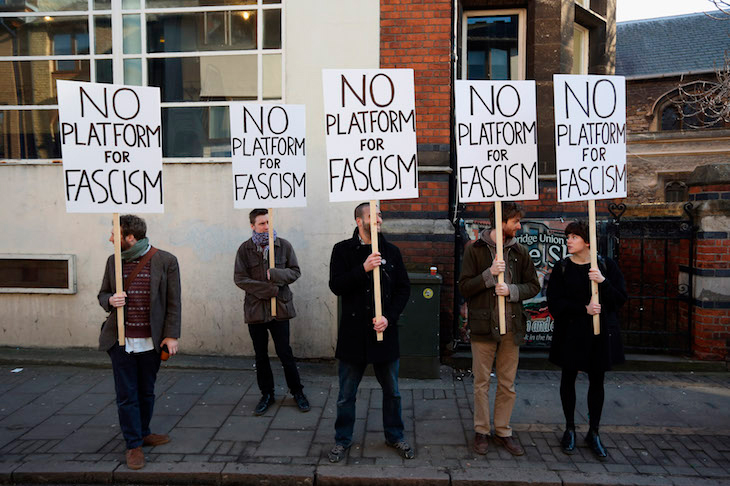Last week, a friend quoted a two-year-old email of mine: ‘I’m starting to root for a plague or world war to purify western culture, burning to cinders all the petty, neurotic, witch-hunting cliques with the white heat of real problems.’ Depressed by my own foresight, I wrote back: ‘The trouble with this solution is that then you still have the real problems.’
Yup. But since the real problems aren’t going anywhere any time soon, and we’ve so little to celebrate while the world goes to hell without the comfort of even a hand basket, let’s consider the possible benefits.
I’ve often remarked that identity politics is the product of prosperity. The movement’s nitpicking about undetectable-to-the-human-eye ‘microaggressions’ is an indulgence, most commonly among affluent white people hungry for the illusion of having problems (and enemies) for a sense of meaning. By definition, neurosis is the gratuitous invention of problems, and now properly unimaginary problems are dropped off daily on our doorsteps (please retrieve with latex gloves), with more than enough to go round for everybody.
Should unemployment skyrocket in the US, the fracas over Confederate monuments will evaporate
Arguably, humanity by nature requires challenging obstacles to overcome in order to feel purposeful, so that when societies become too coddling, too safe and too comfortable, they also become neurotic: they construct make-believe problems to chafe against, like scratching-posts for pets.
This isn’t to dismiss racial friction — identitarians’ leading obsession — as already sorted or trivial. Should these panic-driven lockdowns continue, we’re seriously inching towards at least partial societal collapse. In a more Darwinian environment, disparities of power will really matter: who has stockpiles of food, who can defend their property, who can command resources like energy. When faced with inability to buy groceries or pay the rent, minorities at such palpable disadvantage will not give two hoots about removing statues of university benefactors who profited from the slave trade. Should unemployment continue to skyrocket in the US, the fracas over Confederate monuments is bound to evaporate.
We might be gladly shed of confected problems whose gestural solutions, like tearing down statuary, don’t improve anyone’s life. But once again, when you solve fake problems with real problems, then you’re stuck with the real problems.
After commentators’ initial we’re-all-in-this-together rhetoric about disease being the great leveller, race has resurfaced as a source of division during the pandemic (even if I predicted it would in an interview weeks ago; as a cynic, I’m really sick of being right). In the US, Covid-19 has proved more lethal among blacks and Latinos; in the UK, among blacks and Asians. It’s possible that a tragic genetic proclivity will emerge. An aggravating factor in the US is minorities’ reduced access to good healthcare. But doctors on Covid wards say that one underlying condition especially apt to produce a dire outcome is obesity. This is awkward. Patronising liberal apologists often blame the American correlation of race and fat on ‘food deserts’ in low-income neighbourhoods, but the phenomenon isn’t as simple as an inability to buy broccoli. It’s having no interest in eating broccoli — just like George Bush.
‘Inequality’ is likewise poking its familiar head above the parapet once more. In the popular conception of lockdown, poor and low-skilled workers are living on top of one another in cramped flats, up to their necks in dirty laundry and crying babies, while posh families are swanning about their vast estates picking bluebells and nightly getting pissed on claret. Uber drivers can hardly work from home, while many in the executive class seem so contented at their bedroom laptops that we have to wonder why we ever had offices. But within the year, we may silence the long-standing left-wing complaint about unjust distribution of wealth with the solution many a Corbynista seemed to relish: making everyone broke. It won’t be a nice life, but it will be fair.
As we’re told social distancing may remain the form until a vaccine is found (ergo, prospectively forever), #MeToo is finished. Sexual harassment from two metres away doesn’t cut it. Aside from spouses sheltering cosily in place while other established couples beat each other purple after failing the ultimate suitability test, there are no relations between the sexes. With young people obliged to court by bullhorn, the issue of ‘consent’ is nugatory. Consent to what? And of course we’ll have no more abuse of power by handsy corporate higher-ups because there will be no companies.
Lots of lefty lingo may seem irrelevant and old hat in the newly scorched economic landscape, from white saviour narrative
to heteronormative. But there’s one perfectly apolitical word that I’m dying to quash, if not make illegal: vulnerable. As its forerunner inappropriate went viral for being so usefully vague, vulnerable
has grown so popular because it can refer to practically anybody: children, old people, poor people, women, the disabled, minorities, kids with free school meals, wards of the state — not to mention the at-risk population for Covid-19.
Anyway, I figure some lexical fads burn themselves out in such a bonfire of over-usage that newscasters can reach for no other word: ‘I’m vulnerable to the vulnerability of the vulnerable, Cathy, are you vulnerable, too?’ ‘I’m vulnerable to vulnerable vulnerability, but not as vulnerable to vulnerability that’s less vulnerable than the truly vulnerable, Jon.’ Eventually you’ll turn on Channel 4 and it’ll be, ‘Vulnerable, Cathy! Vulnerable vulnerable.’ ‘Vulnerable, Jon! Vulnerable vulnerable vulnerable. And that’s all from us. Good night.’ Beyond that point, anyone who says vulnerable will be shot.
As for the identitarian crowd, have pity. When you’ve been perpetually outraged over trifles, it’s a real shock to suddenly have good reason to be outraged. When your concern for minorities has been overwhelmingly linguistic, it’s a real shock when you suddenly have bloody good reason to be concerned about minorities. When you’ve claimed for years that society as currently arranged is ‘unsustainable’, it’s a real shock when suddenly society really is unsustainable — and one of the first things that’s unsustainable is your job.







Comments